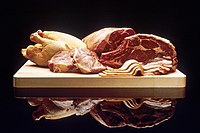
Photo from wikipedia
A new strain of Qinchuan cattle (QNS) has been obtained after more than forty years of selective breeding, and it shows good performance and production traits. To characterize the genetic… Click to show full abstract
A new strain of Qinchuan cattle (QNS) has been obtained after more than forty years of selective breeding, and it shows good performance and production traits. To characterize the genetic changes that have resulted from breeding, we sequenced 10 QNS and 10 of the original breed Qinchuan cattle (QCC) for the first time, with average of 12.5-fold depth. A total of 31,242,284 and 29,612,517 SNPs were identified in the QCC and QNS genomes, 47.81% and 44.36% of which were found to be novel, respectively. Furthermore, population structure analysis revealed the selection that these cattle had experienced. Then, 332 and 571 potential selected genes were obtained, associated with enhanced immunity and acclimatization in QCC (CD5, SMARCA2, CATHL2, etc.) and production or meat quality traits in QNS (PLCD3, MB, PPARGC1A, etc.). These results revealed the efforts of selective breeding for Chinese Qinchuan cattle, and will be helpful for future cattle breeding.
Journal Title: Genomics
Year Published: 2018
Link to full text (if available)
Share on Social Media: Sign Up to like & get
recommendations!